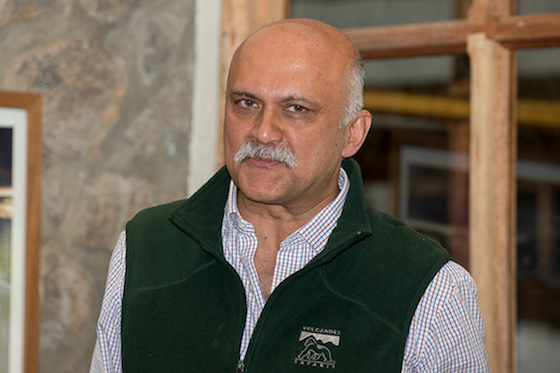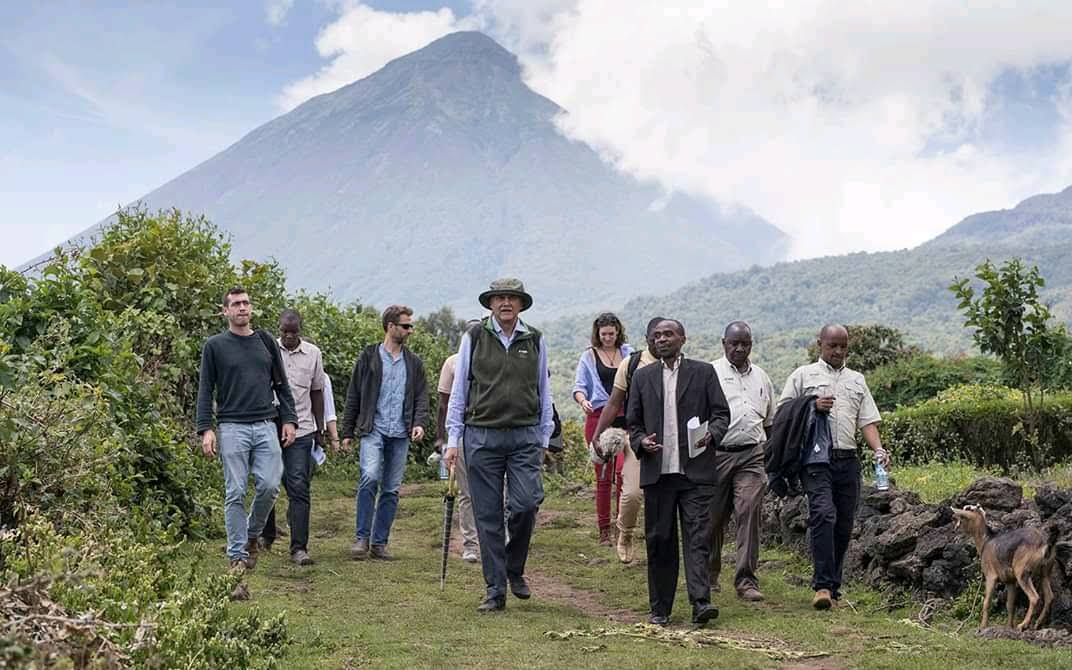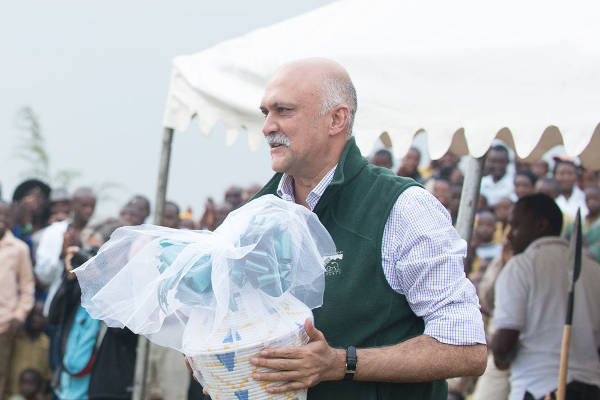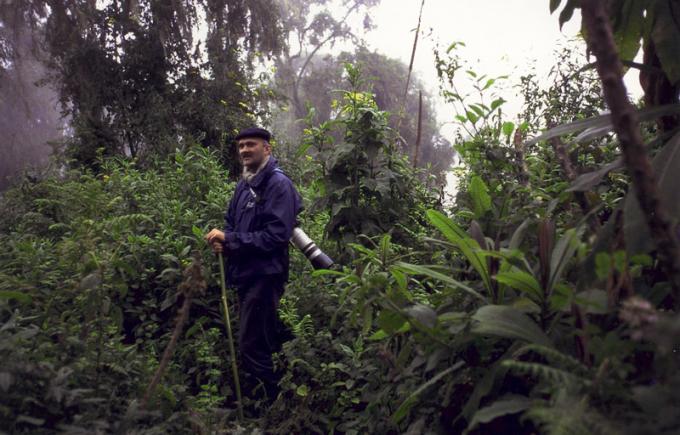Praveen Moman
Conservation legend of Eswatini (Swaziland)
Praveen Moman
Praveen Moman, the founder of Volcanoes Safaris, first went walking near Gahinga in 1966 aged twelve with his father Kuldip Rai Moman. Over thirty years later, in 1997 he returned to the region to help rebuild gorilla tourism and the following year started to build Mount Gahinga Lodge, the first Volcanoes Safaris lodge. Those were difficult days in the aftermath of the genocide and upheaval in the Great Lakes region. Today Mount Gahinga Lodge is a much loved jewel and symbolises the connection of Volcanoes lodges with communities and conservation. It is the perfect base to go gorilla tracking, track the rare golden monkey, climb a volcano, walk through local villages and most of all to share the culture of the Batwa.
Praveen Moman grew up in the wilds of Uganda, where the family was part of the pioneering Asian community that was central to opening up East Africa. He then moved to the UK as the family became refugees with the Amin expulsion. This was followed by a career as a political and policy adviser in the European Union and British Government, including working in the European Parliament; for Lord Cockfield, Vice President of the European Commission: Lord Heseltine, former UK Deputy Prime Minister; Lord Renton, Minister for the Arts; and Lord Newton, Leader of the House of Commons.
Praveen founded Volcanoes Safaris in 1997, which has been at the forefront of reviving gorilla tourism in Uganda and Rwanda. Under Praveen’s guiding vision, Volcanoes has designed and built four unique lodges near the great ape parks – Virunga, Mount Gahinga, Bwindi and Kyambura. The luxury lodges are sensitive to local culture and aesthetics, the post-conflict context and the need to use resources responsibly. Local people have been trained and empowered to run and manage the lodges.
In 2000, Volcanoes Safaris became the first international safari company to take clients to Rwanda and in 2004 built the now renowned Virunga Lodge. It helped kick-start gorilla tourism after the genocide through the Volcanoes BLCF Partnership Project. In 2005 the company become a charter signatory to the UN Kinshasa Declaration on Saving the Great Apes, the only safari company to do so. Then, in 2009, Praveen established the Volcanoes Safaris Partnership Trust (VSPT), a non-profit organisation that aims to create long-term, self-sustaining projects that enrich the livelihoods of local communities and promote the conservation of the great apes. Today the company is recognized for the unique great ape tourism model it has created. In recognition of this work, Volcanoes Safaris received both the Travel + Leisure Global Vision (2012) and Condé Nast Traveler World Savers (2013) awards. Also in 2013, Praveen was asked to join the Congo Basin Forest Partnership, which promotes sensitive economic development of the forests of Central Africa. Praveen has been described as a ‘visionary conservationist’ by the Financial Times and as ‘one of top twenty-five conservation-philanthropists’ in Africa by Departures Magazine. In 2014, Into the Virungas, a conversation with Praveen about his essential vision to champion the people, the animals and forests of Africa was published. In 2016 the VSPT Bwindi Bar near Bwindi Lodge won the Pure Community Engagement award for training disadvantaged youths; Virunga Lodge was recognized as Africa’s most romantic retreat by the World Boutique Awards. In March 2017, the Dian Fossey Map Room was opened at Virunga Lodge by Praveen. The Map Room pays tribute to the unique contribution of Dian Fossey and other conservationists, to mark the 50th anniversary of the Karisoke Centre. A catalogue and exhibition entitled ‘Conservationists and Explorers of the Virunga volcanoes’ was published. Praveen was educated in Uganda and at London and Cambridge University in the UK; he is a former VSO volunteer in Jamaica; and a Robert Schuman Scholar of the European Parliament. He has been involved in Seva Mandir since 1994, a respected Indian charity and is currently a Vice-Patron. Since 2012 he has been a trustee of the Imbabazi Foundation in Rwanda, which supports genocide survivors; He has been on the Advisory Board of the Adventure Travel Trade Association in the USA since 2009; since 2014 he has been on the Board of the Edward Heath Centenary Trust; on the Board of the Eastern Africa Association, since 2015 a member of the Memorial Gates Council; a trustee of Women Matter; and since 2016 on the Advisory Board of the Rwanda Cricket Stadium Foundation and the Board of the Adventure Travel Conservation Fund (ATCF). He is married and has one son and lives in London, Uganda and Rwanda.Courtesey: Volcanoes Safaris
PRAVEEN'S VISION FOR CONSERVATION
Volcanoes Founder, Praveen Moman, recently spoke at the Great Apes Summit in Jackson Hole, USA. The summit addressed many of the issues that affect the conservation of great apes. Praveen Moman was invited to speak as the great ape tourism expert and highlighted the following points:
• Conservation must become part of the economic mainstream if national parks and great apes are to survive. • Communities should be central to the vision of conservation. Getting bread on the table for local people is essential. • Sensitive controlled tourism, and the involvement of the private sector, is central to the survival of the protected areas and the habitats and animals. • This is the great ape ecotourism model that Volcanoes Safaris has pioneered in Uganda and Rwanda. • Tourism may not match the economic return of extractive industries such as oil and minerals but it can create livelihoods which is essential to safeguarding protected areas.THE BATWA
For centuries the Gahinga Batwa people – forest-dwelling hunter-gatherers once referred to as pygmies – lived side by side with the gorillas. The Batwa were not a major threat to the animals, but 25 years ago they were evicted from their forest homes and while the gorilla conservation projects proved successful, the Batwa became conservation refugees. With no support from the government or anyone else, displaced, unwanted and desperate, they lived an alien lifestyle on the forest edge, working on farms and labouring. As they struggled and starved in abject poverty, exposed to disease and abuse, their future looked bleak. But then Moman, who whose years of working in tourism and gorilla conservation had made him a close student of the Batwa and their culture, came to the rescue. Buying ten acres of land close to Gahinga Lodge and building materials, he asked the architect responsible for the lodges, Felix Holland of Studio FH Architects, to work with the Batwa to design a village.
The new village was officially opened and represents a permanent settlement for the community of 100 adults and children, 25 years after they were forced out of the Mgahinga National Park.
“I knew the Batwa existed since the first time I came here,” said Moman. “I thought, ‘Why shouldn’t we do something, they are our neighbours, our people? They’ve been thrown out of the park, with no rights or land.’”
At first the Batwa were reluctant, as others had let them down, but building started last year. Moman’s organisation provided the materials and land, and the Batwa the labour, spending months carrying on their heads for miles the soil used for plaster. “Every time I come to the village, the Batwa seem more alert and proactive, they have more hope, that’s good,” he said. The Batwa’s traditional forest dwellings were very small domed huts made of grass and twigs and initially the houses they envisaged had tiny one-by-two-metre rooms, but they were persuaded to make the rooms larger. The outcome is a timber sub-frame of eucalyptus poles, and a bamboo grid covered with earth plaster holding everything together – self-sustaining materials that are free and easily maintained.
At the opening at the village, a short walk through surrounding farmland from the lodge, we were welcomed by the Batwa, who performed traditional dances and proudly took our hands for a tour of their new homes and thatched vocational centre. At the nearby community centre, the main focal point of the village and location of planned adult education classes, their skilled basketwork, carvings and other craftwork were for sale – another opportunity for the Batwa to create income. There’s also a Batwa Heritage Trail close to Mount Gahinga Lodge, where Batwa children, and visitors, can connect to the Batwa’s ancestral past. Gardens have been built and there will be a time when they can sell what they grow, their former poorly or unpaid labouring work behind them and their goal now to be self-sufficient landowners. The village continues to be supported by Volcanoes Safaris and Volcanoes Safaris Partnership Trust, as well as donations from guests.A people who had everything taken from them, the Batwa now have a chance to improve their lives. In the forests of the Virunga Mountains the future looks positive for animals and humans alike.
Courtesey: Lisa Young from www.scotsman.comAWARDS
Winner of the Newsweek Future of Travel Awards 2021.
”Praveen Moman has taken a subtle but powerfully different stance than many on wildlife preservation: If you don’t focus first on working with the people that live near the wildlife, your efforts for conservation will eventually fail. People first, then the wildlife are taken care of naturally”- Shannon Stowell, CEO of the Adventure Travel Trade Association.
ARTICLES OF INTEREST
Volcanoes Safaris 25 Year Anniversary Video 2022 (video)
Volcanoes Safaris celebrates 25 years!
Praveen Moman: Celebrating Gorillas and Communities (video)
MEET THE MAN WHO CHANGED VACATIONING IN RWANDA FOREVER (An Interview with Praveen Moman)
Go back to: Leaders in tourism and conservation



